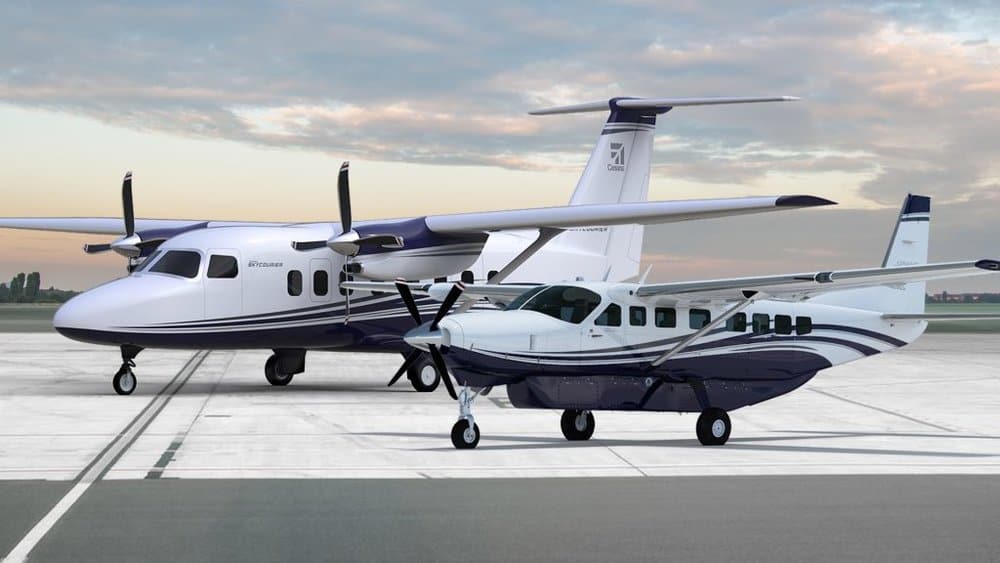
FedEx Express has announced that it will buy 50 new Cessna SkyCourier 408 cargo planes with an option to order 50 more from Textron Aviation. The purchase is worth up to $550M, based on the SkyCourier’s list price of $5.5M. One plane will be delivered per month to FedEx’s Memphis-based air express division beginning in 2020. The FedEx Express Feeder network is an important component of the overall global linehaul network, serving markets too small for direct FedEx Express air linehaul service and markets where FedEx Express does not have operating rights.
Shifting to the SkyCourier—with twice the volumetric capacity of the older Cessna Caravans—will effectively put more capacity into FedEx’s shorthaul air freight business, which has several implications. Air freight forwarders who move freight by truck from airport to airport, and who account for the large proportion of air freight that never actually sees a plane, will lose a piece of their business because it will be more economical for FedEx to carry cargo on its own planes. That might not be a bad thing for air freight forwarders, though, because it could allow them to avoid sending out partial truckloads to fulfill service commitments. And, in general, the faster, higher-capacity SkyCouriers will have the effect of speeding up the supply chain and enabling more freight to be shipped same-day and next-day to smaller markets.
“This continues our very successful fleet modernization strategy, which improves our fuel efficiency, reliability and operating costs,” FedEx Express President David Cunningham said.
The Cessna deal represents the second recent order by FedEx Express meant to upgrade their fleet of feeder aircraft serving small- and medium-sized markets—in early November, the carrier agreed to buy 30 ATR 72-600F planes from French manufacturer ATR, with an option to buy 20 more. FedEx’s expansion of its air freight business comes as demand for global air freight increased 5.9 percent in October, outpacing the 3.2 percent average growth rate in air freight capacity over the last decade, according to the International Air Transport Association.
FedEx Express’ feeder fleet currently uses 238 aging Cessna Caravans—these will be phased out and replaced by the SkyCouriers beginning in 2020. The infographic below compares the specifications of the two Cessna aircraft.

The SkyCourier 408 is a powerful high-wing utility twin turboprop designed for shorthaul flights that will replace older planes in FedEx Express’ fleet of more than 300 feeder aircraft. FedEx has long been an operator of the Cessna Caravan, a twin engine prop plane that entered service in 1982—the SkyCourier represents a significant upgrade over this plane. The SkyCourier can carry up to 19 passengers or up to 3 LD3 shipping containers, with a total payload capacity of 6,000 lbs; by comparison the Caravan can carry up to 9 passengers or 3,070 lbs of cargo. The SkyCourier is slightly faster than the Caravan, with a maximum cruising speed of 200 knots over the Caravan’s 186 knots, but has a slightly shorter range (900 nautical miles compared to the Caravan’s 1,070 nmi range). FedEx said the Cessna SkyCourier 408 will be assembled by Textron Aviation in Wichita, Kansas.
“We worked closely with Textron Aviation to develop the Cessna SkyCourier 408, which includes several key features that will help us grow our business in small and medium-sized markets, especially in the air freight segment,” Cunningham said.
FedEx Express’ upgrade of its feeder fleet parallels the modernization of its jet fleet in the past few years, which has seen orders for larger, more efficient planes like the Boeing 777, 767, and 757. The fleet modernization initiative is intended to help FedEx Express reach its goals of improved fuel efficiency, aircraft reliability, reduced emissions, and larger profit margins.
The feeder aircraft acquired by FedEx indicate that the company is tightening its supply chains to speed delivery and become more responsive to demand volatility across time and space. In other words, FedEx is positioning itself to address seasonal and time-specific variations in demand as well as geo-specific variations in demand—the SkyCourier will be able to quickly deliver large volumes of freight to smaller, more remote airports that lack major freight terminals.
According to C.H. Robinson’s 2017 white paper Optimizing Your Supply Chain with Air Cargo, mode-neutral logistics providers use air freight to help shippers extend the shelf life of time-sensitive goods, reduce inventory carrying costs, and capture market share by establishing reliable access to emerging markets. Despite the occasional weather delay, air freight is still the shipping mode with the lowest average probability of impediment.
Stay up-to-date with the latest commentary and insights on FreightTech and the impact to the markets by subscribing.







